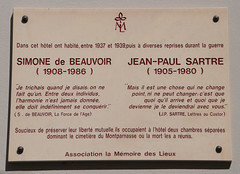Jean-Paul Sartre
Jean-Paul Sartre
(1905-1980)
philosopher, playwright, novelist, political activist, biographer, literary critic, and Nobel Literature Laureate (from 1964)
Commemorated on 1 plaque
Dans cet hôtel ont habité, entre 1937 et 1939, puis à diverses reprises durant la guerre, Simone de Beauvoir (1908-1986) – Jean-Paul Sartre (1905-1980). Soucieux de préserver leur liberté mutuelle, ils occupaient à l'hôtel deux chambres séparées dominant le cimetière du Montparnasse où la mort les a réunis.
English translation: In this hotel lived, between 1937 and 1939, and on various occasions during the war, Simone de Beauvoir (1908-1986) - Jean-Paul Sartre (1905-1980). In an effort to preserve their mutual freedom, they occupied two separate rooms in the hotel overlooking the cemetery of Montparnasse, where they were united by death. [AWS Translate]
Hôtel Mistral, 24 rue Cels, Paris, France where they lived

